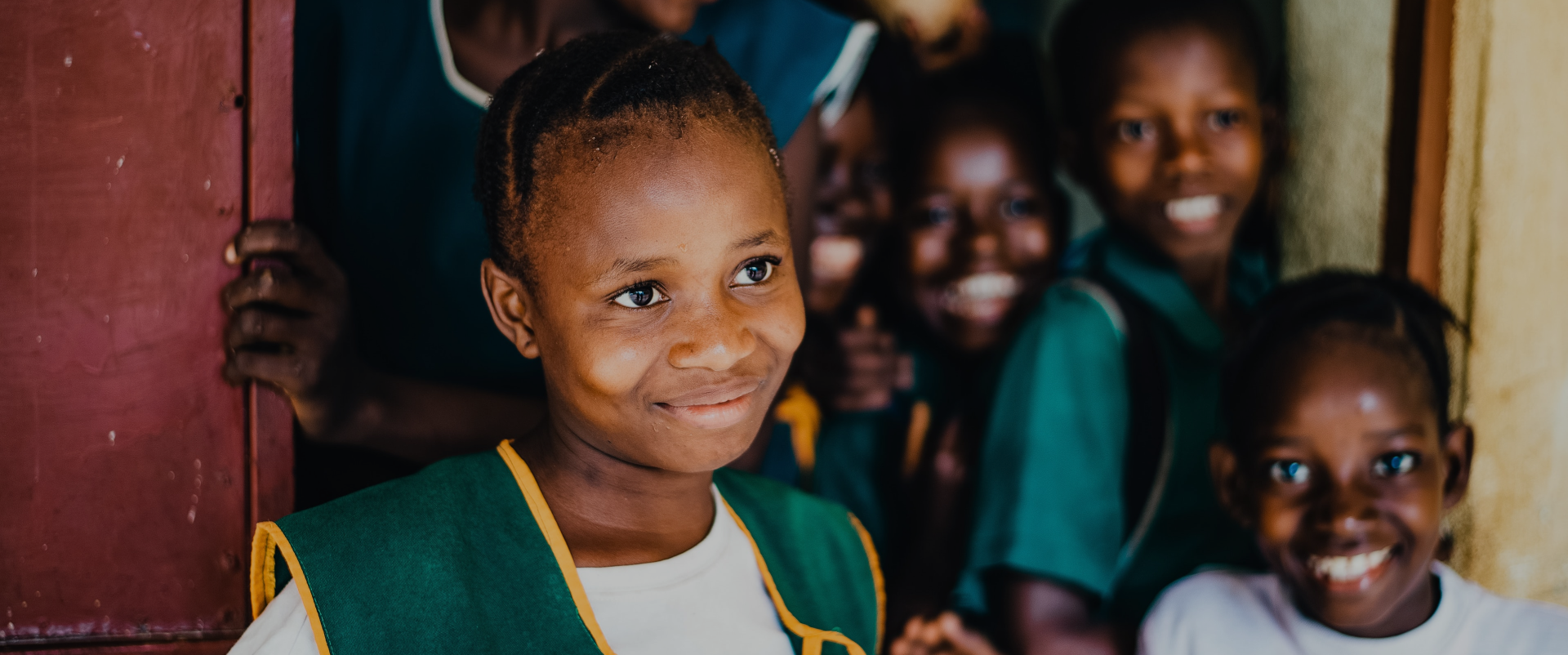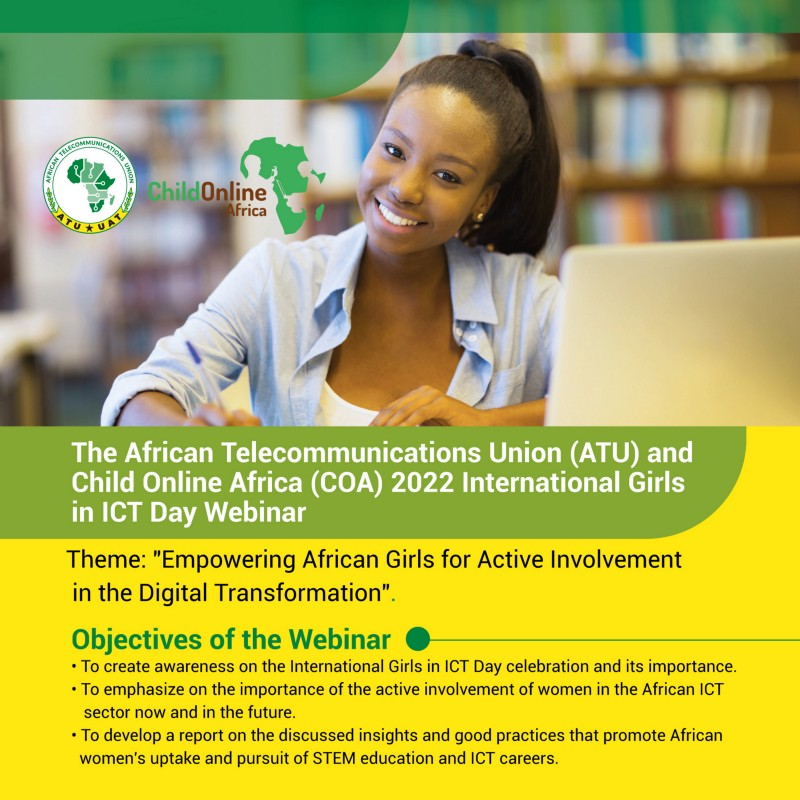
A Recap Of Girls In ICT Day 2022
Girls in ICT day is a day set aside to motivate young girls in the country and empower them to consider careers in the growing field of ICT. The day is celebrated on the 28th of April 2022. The main goal of the girls in ICT day aims to cultivate the presence and digital skills of young women particularly in the area of STEM.
Day 1 which happened on the 25th of April 2022 was organized by ATU in conjunction with Child Online Africa. The theme was empowering African girls for active involvement in digital transformation.
On day 1 the forum started with opening remarks from John Omo. He mentioned not very encouraging statistics that Africa has for eg “our population as a continent stand at 1.4 billion, out of 1.4 billion 50% of that population are Women and as such only 28% of that population pursue STEM careers. He ended by saying collaboration brings greater impact. Working alone you can do little but working together we can do a lot and go far.
Madam Anne Rachel Inne (The Regional Director for International Telecommunications Union Regional Office for Africa (ITUROA)stated that the main goal for Girls in ICT day aims to cultivate the presence and digital skills of young women and girls in the career field of STEM, particularly in ICT in an effort to bridge the gender digital divide and the theme of this year is on access and safety.
Madam Awo Aidam Amenyah spoke about CSO's Role in the uptake of STEM Education in Africa. She spoke about STEM in the context of Africa. What has contributed to young girls for that matter not being so seen in the discussion but it’s an issue of prioritizing
- Female participation in math and physical sciences lags to some degree behind that of males.
- Some authors explain that gender differences in the achievement of STEM-related courses begin from in-born differences to external exposure and influence.
- Others have blamed these generated differences in science achievement on social-cultural issues.
How could CSOs Promote STEM Education
- Advocacy: Make a case with policymakers at all levels on the need to promote STEM education.
- Capacity building and awareness: Need-based training knowledge transfer of teachers. Information sharing channels.
- Evaluation: Ensure some of the provisions in the advocacy plans are being implemented to the latter.
- Tools and other resources: Multi-stakeholder content building-resource support.
Alicia Tambe stated that we need to understand what are the barriers to inviting the ladies' full participation in girls in the ICT sector in the first place.
Olanrewaju spoke about the good practice and programs implemented by learning institutions to promote the uptake of STEM in education for young women. The education of girls in STEM cannot be overemphasised because it plays a major role in society. The more girls in STEM education the more productive the country. He also stated that it is believed that early exposure of girls to female role models will make them excel and do well in life.
Adwoa Konadu spoke about the barriers that hinder young women and girls to pursue a career in STEM. Some of the barriers she stated were lack of encouragement, discouragement from friends and families, distractions can also cause a deviation in the path set out, lack of role models, lack of funds, and gender inequality.
The opening remarks was given by the Executive Director of Child Online Africa (Awo Aidam Amenyah) at the E-Mentoring session to mark the girls in ICT Day 2022.
“I deem it an honour and a privilege to be giving the opening remarks for this future proof event on a special day like this: International Girls In ICT Day 2022 which is being celebrated across the globe under the theme: Access and Safety.
We are happy to be bringing you this event with the support from African Telecommunications Commission (ATU), Nigerian Communications Commission (NCC), International Telecommunications Union(ITU), Innovare Ltd, Sierra Leone Communications Commission, Ruheso Tanzania and Mussollini Salem
Permit me to commence with a quote by the late President of Tanzania H.E Julius Nyerere, Education for Self-Reliance, 1967. “This is what our educational system has to encourage. It has to foster the social goals of living together, and working together, for the common good. It has to prepare our young people to play a dynamic and constructive part in the development of a society in which all members share fairly in the good or bad fortune of the group, and in which progress is measured in terms of human well-being, not prestige buildings, cars, or other such things, whether privately or publicly owned. Our education must therefore inculcate a sense of commitment to the total community, and help the pupils to accept the values appropriate to our kind of future.”
If anything has brought us together over the last 2 years, it is our feeling of vulnerability about the present and uncertainty about the future. We now know, more than ever, that urgent action is needed to change humanity’s course. But this action must be long-term, and combined with strategic thinking.
Education plays a vital role in addressing these daunting challenges. Yet, as the pandemic has shown, education is fragile: At the peak of the COVID-19 pandemic, reports indicated that 1.6 billion learners were affected by school closures across the globe.
UNESCO’s new report, Reimagining our futures together: A new social contract for education has spelt out some thought-provoking recommendations in it for the future of education and I entreat all of us looking forward to contributing to the AFRICA WE WANT goals to take a read.
The report proposes a new social contract for education — one that aims to rebuild our relationships with each other with technology. based on the right to quality education throughout life, embracing teaching and learning as shared societal endeavours, and therefore common goods.
I believe it will also get us prepared for The Transforming Education Summit set for September 2022 which according to the UN Deputy Secretary-General Amina Mohammed is aimed at “averting a generational catastrophe and rethinking education systems.” She believes learners must be equipped with skills and knowledge to excel in a rapidly changing world.
Digital technologies, tools and platforms are meaningful when they are used to enhance humanity. To state the obvious, digital literacy and access are a basic right in the twenty-first century; without them it is increasingly difficult to participate civically and economically. One of the painful realizations of the global pandemic is that those with connectivity and access to digital skills were able to continue to learn remotely while schools closed down (and to benefit from other vital information in real time), whereas those without such access and skills missed out on learning and the other benefits physical learning institutions bring. As a result of this digital divide, gaps in educational opportunity and outcomes between and within nations were heightened.
The truth is we cannot allow our educational goals and for that of the African girls to fall short of the aspirations we have for it.
We believe education must aim to unite us around collective endeavours and provide the knowledge, science, and innovation needed to shape sustainable futures for all hence this session to hear from you all.
A new social contract for education must be anchored in two foundational principles: (1) the right to education and (2) a commitment to education as a public societal endeavour and a common good.
One of the key take away from this session should be that information without empowerment, and digital technology in education without clear purposes, are not desirable for the Africa We Want.
Our speakers and moderators will help us understand how to make things happen in the area of STEM.
One of the ways to make education in the future to best support individuals, communities and societies for meaningful work and economic well-being is by giving girls Access and Safety.
Education should be geared to enable people to create long-term social and economic well-being for themselves, their families, and their communities and this should include creating Access and Safety for girls to pursue careers in STEM.
Mr Kafui Prebbie a Global Development Expert, Project Manager and Social Entrepreneur stated that many of us do know that governments drive policies. Governments supersede the implementation of strategies what we do not know is that we have to work hard to support what government initiatives do. I'm expecting governments will push for the incorporation of these policies in the implementation strategies by those agencies that work directly under the ministries in Ghana.
The other thing I'm expecting the government to do is to public private-public partnerships. The government must support these private-public partnerships that lack the resources to be able to move projects about girls in ICT forward.
Governments should also provide the opportunity for corporate institutions that will invest in girls or support girls to provide growth opportunities.
Government should support corporate institutions to have CSR initiatives that support girls in ICT day.
Most of the participants who were girls in the discussion connected from:
Ghana
Nigeria
Tanzania
Kenya
Sierra Leone
Malawi
South Africa
Zambia
Cameroun
The Gambia
Recorded by: Benjamin Adadevoh

